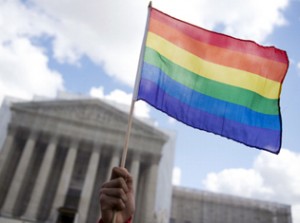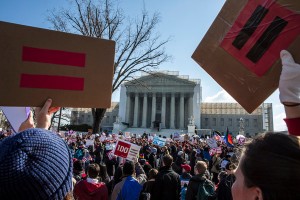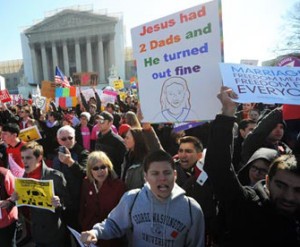 I was raised in a household that was openly affirming of gay, lesbian, bisexual and transgendered folks long before that was commonplace in American society. In the early 1990s, I joined my parents in gay rights rallies and parades in Wichita, Kansas. I grew up with GLBT folks in my community, and my parents encouraged me to watch movies and read books about the devastation that was being caused by a deadly combination of a virulent AIDS virus, and an equally virulent homophobia that permeated much of our culture. I was raised to be an ally.
I was raised in a household that was openly affirming of gay, lesbian, bisexual and transgendered folks long before that was commonplace in American society. In the early 1990s, I joined my parents in gay rights rallies and parades in Wichita, Kansas. I grew up with GLBT folks in my community, and my parents encouraged me to watch movies and read books about the devastation that was being caused by a deadly combination of a virulent AIDS virus, and an equally virulent homophobia that permeated much of our culture. I was raised to be an ally.
Marriage equality has always been a no-brainer for me. As a child, I got to see my father and another important leader in my church have their ministerial credentials revoked by the Quaker Church because of their openly expressed conviction that gay relationships were not inherently sinful. The fact that they came to this conclusion out of a process of prayer and serious engagement with what the Bible says (and does not say) about homosexuality did not seem to matter. They were run out of my childhood church like heretics.
So why do I feel so conflicted about the current debate happening at (and outside of) the Supreme court?
 We have clearly reached a tipping point in our country. There is little doubt that, sooner or later, gay marriage will be the law of the land. Just as surely as “states’ rights” ultimately could not trump the civil rights of black citizens in the 50’s and 60’s, the vigorous objections of a religious minority cannot long hold back the recognition by most Americans that gay folk deserve the same fair treatment that heterosexuals are entitled to. I should be overjoyed – and many ways I am! – so why do I feel so uneasy?
We have clearly reached a tipping point in our country. There is little doubt that, sooner or later, gay marriage will be the law of the land. Just as surely as “states’ rights” ultimately could not trump the civil rights of black citizens in the 50’s and 60’s, the vigorous objections of a religious minority cannot long hold back the recognition by most Americans that gay folk deserve the same fair treatment that heterosexuals are entitled to. I should be overjoyed – and many ways I am! – so why do I feel so uneasy?
I feel all churned up inside, and I feel pain when I see pictures, read articles or hear stories about the debates happening in and around the US Supreme Court this week. The court may soon make a ruling that could have a profound impact on the rights of LGBT folks in this country, ensuring that all spouses enjoy the same protections under the law. And that would be wonderful! So, why, my soul, are you downcast? Why so disturbed within me?
I think the reason I feel so disturbed is because I can see myself in both sides of this argument. I am overjoyed that my gay brothers and sisters may soon be afforded full protection under the law, freedom to live their lives in peace and build healthy families. I think of my friends who have suffered from the lack of societal recognition and legal protection that my wife and I enjoy. I want them to be embraced and respected by civil society.
 At the same time, I recoil from the rights language that so many advocates of gay equality have chosen to embrace. Though some of us have certainly chosen to make a moral argument for gay liberation, the overall conversation – especially from the liberation side – has mostly been cast in terms of legalities and appeals to human reason. The wisdom of this world.
At the same time, I recoil from the rights language that so many advocates of gay equality have chosen to embrace. Though some of us have certainly chosen to make a moral argument for gay liberation, the overall conversation – especially from the liberation side – has mostly been cast in terms of legalities and appeals to human reason. The wisdom of this world.
While I profoundly disagree with the conclusions, reasoning and underlying assumptions of those who oppose marriage equality, I cannot help but feel that they, too, bring an important perspective that is being lost. I hear the voices that are crying out today – “But what about righteousness?” – and I know in my heart that this is the right question.
I believe that God creates people with gay orientation for a reason. I am convicted that God loves and blesses gay people and gay marriages. But if the best we can do as the Church is to back up some secular agenda (whether pro- or anti-gay equality), speaking in rights language and arguing legalities, we fall short of the Kingdom of God. I wonder what our country would look like if all of us – regardless of our beliefs surrounding gay marriage – would seek first the Kingdom of God, and God’s righteousness.
 What if we as a nation humbled ourselves to seek God’s way? I am convinced that we would find ourselves drawn into a society where steadfast love and faithfulness meet; righteousness and peace kiss each other. If we opened ourselves to seeking the love and truth of Jesus, I feel certain that not only would we affirm marriage equality, we would also affirm the basic moral impulses that currently lead some to conclude that homosexuality is wrong. Can we imagine a society in which we would have the courage to lay down our need to be right in order to seek God’s righteousness?
What if we as a nation humbled ourselves to seek God’s way? I am convinced that we would find ourselves drawn into a society where steadfast love and faithfulness meet; righteousness and peace kiss each other. If we opened ourselves to seeking the love and truth of Jesus, I feel certain that not only would we affirm marriage equality, we would also affirm the basic moral impulses that currently lead some to conclude that homosexuality is wrong. Can we imagine a society in which we would have the courage to lay down our need to be right in order to seek God’s righteousness?
All of this is not to say that there is not a struggle ahead. In any movement for justice there will be struggle, and we have an obligation to participate. As followers of Jesus Christ, we must lend our prophetic voice to the call for gay liberation. But can we do this from a posture of firm, unyielding love and a humble seeking after God’s will for our society? What would that look like? If anything, I suspect it would look a lot more creative than the public debate we are witnessing now.
For someone else’s blog where the concern about how the debate is shaping up, see http://daviddflowers.com/2013/03/26/support-us-or-youre-a-bigot/
The civil/political discussion going on today in courts and legislatures, we need to recognize, has little to do with what we as people of faith should be doing. Whatever the courts rule, whatever legislatures decide, religious communities will have to come to terms with what they believe God asks of us in love. This is one of those moments where we want to affirm the separation of church and state. The state needs to make its decisions in the context of according equal rights, but those are different and lesser questions than those we face in submitting ourselves to God’s will.
Lot of truth to that, Doug. Though, that still leaves us with the question: How do we as Christians operate within a society where most of us have (at least theoretically) been given a small measure of political authority?
For me, that’s not an easy question to answer. But it feels important to maintain a prophetic witness to the state, reminding our human governments that we/they are ultimately accountable to God.
I cannot unite with that Micah. I am not willing to place my religious beliefs in any position of superiority to those of anyone else while in the political arena. I am sure that in doing so I would be falling into the same cesspit that neoconservatives try to splash on anyone who offends their view of what is acceptable behavior. If I hold that my religious views are somehow superior to others in a political context I am asserting that such views have a valid place in political discourse and in doing so I have offered oppressors a club to beat people with.
Having transported and fought for the lives of the collateral casualties of the cultural war; in which religious beliefs are used to justify their deaths; I am unwilling to take any risk of validating a roll for any religion in determining what others may or may not do within the constraints of earthly law. Like the crew of a vessel that’s hull has been breached I have no interest in trying to understand the place of the sea in God’s plan for the world until the watertight bulkheads on either side of that breach have been shored up, dogged down, and secured from the keel to the weather deck and beam end to beam end. I don’t want to maintain the wall between church and state. I want to build it higher and thicker until even a bird will take another route rather that try to get over it. I realize that my response here is more visceral than contemplative. My problem is that I have been called to care for woman who were white as woodland fog and just as fragile. I have worked in the back of an ambulance, repeating the blood pressure of a woman, who has been butchered by an underground abortionist, every five minutes as her life drains away. I have leaned through the passage way to the cab and said “For the love of God push it as hard as you dare.” Like the protagonist played by Nicholas Cage in the movie Bringing Out the Dead I am haunted by the memories of the patients that we lost. For me those woman are the best example of the role that religious belief has played in secular politics. The idea that I may yet have to get back into a facet of emergency medicine that I had dared to believe I could leave behind frightens me at a very personal level. As I may have said to you before fear, and anger are paternal twins. Despite not being identical they are very close to each other and walk hand in hand everywhere they go. Anger begets violence as violence does death.
By denying myself any claim to righteousness in my political actions I also deny such claims to those who would use that same type of belief to oppress others in striving to make our country a “christian nation.” In this context I must unite with Mahatma Gandhi who is reported to have said “I like your Christ, I do not like your Christians. Your Christians are so unlike your Christ.”
—
Tom Horne
For we hold that in all disaster whether shipwreck fire or sword
that we must stand to our duty when once we have pledged our word.
I think there might be some miscommunication here, Tom. I assume that you support (as I do) the work of Friends Committee on National Legislation, which seeks to influence the decision-making of the US federal government according to our religious convictions as Quakers. I think this is a good example of ways that we as Friends of Jesus are called to speak truth to power.
There’s a reason we call them “rights”, and it’s not completely separate from right-ness, or in biblical terms “righteousness”. Acknowledging rights, protecting rights, and taking restorative action to heal those whose rights are violated, is part of the biblical call to make things right, that is, to live righteously.
You’re right, John, there is definitely a connection. Unfortunately, sometimes it seems to me that “rights” language devolves into becoming centered on getting what we want, rather than seeking what God’s desire is.
The discussion focuses on rights because the goal is political. gay rights activist must use secular language to communicate this secular goal. After all, we cannot assume that most activists are Christians or religious at all. The secular language makes it more inclusive.
That said, it would have been great is the religious supporters of gay rights do use the language of religious righteousness. It would have been a welcome addition to the discussion which could have reached other religious people. It would be a welcomed voice.
I have avoided this topic like a plague because in my opinion neither side of the discussion is open to the truth. Yours is a good attempt to move in that direction but I don’t think those engaged in the discussion are open to accepting the depth of the problem facing the body of Christ.
I, too, am comfortable with the use of “rights” language in political discourse over gay marriage, and a “righteousness” approach outside the halls of the court and legislature. What bothers me is the use of “rights” language by Friends when presenting our testimonies. This happened at New York Yearly Meeting’s Summer Sessions in 2012 when we approved a minute repudiating the Doctrine of Discovery (that Europeans “discovered” the Western Hemisphere, and thus have legal rights to it). That minute had nothing in it that would tell the reader that it came from a religious community, let alone a Quaker meeting. A lost opportunity and an indicator of a general trend toward the secularation of the Religious Society of Friends.
We are all hearing about rights *at this time* because at this time the issue is playing out in the court system, and specifically at the Supreme Court where civil rights is the basis on which the issue is being heard. There have been plenty of ways in which religious communities have prayed together, acted together and urged others to act as well out of a sense of God’s calling and their desire to obey. Just because that’s not what’s in the news at this moment doesn’t mean it hasn’t been happening. I could cite examples if that’s helpful.
Are there other reasons you are uneasy with where same-sex marriage is heading?
Pingback:Rights Vs. Righteousness In the Marriage Equality Debate | River View Friend
Funny, I feel no such disturbance and I was a Catholic for 31 years. We have a deal in this country: I get to practice my faith and “you” get to practice yours. If “you” don’t like same sex marriage, then don’t do it, but don’t invade the domain of other faiths by imposing yours on them. A fairly simple and revolutionary idea – one that we still have to remember and figure out from time to time.We talk about marriage as a “right,” because that’s is what it is in a multi-religious, multi-cultural society. In the end, freedom of conscience is a good cultural agreement, because it is ultimately the only true one. What does the Bible say about same-sex marriage? Nothing really. And I suppose I have as much trouble with worshiping the Bible as any other form of idolatry. These words sound harsh and I honestly do not mean them to be. I’m trying to get ideas down quickly because it’s late at night as I type this.
As a believer, my spiritual conflict sprang from the guilt I had for ignoring the plight of my LGBT brothers and sisters and failing to “Love mercy, do justice, and walk humbly with my God.” I suppose I have long felt that sexual orientation/identity has the moral effect of being left handed – when we didn’t know any better, we didn’t understand it and thought it was evil because it was “different.” So for me this change was just too long in coming. Thanks for your post.
I don’t think it’s quite as simple as that. We as a society often make moral judgments about the fundamental ground rules we want our society to live by. I think that’s a healthy conversation to have, and I believe the church should be active in pursuing righteousness/justice. (I see Friends Committee on National Legislation doing this fairly well.)
I would hate to see faith-based values pushed out of the public square.
Certainly. We actually attempt as a society to legislate morality on a regular basis. My comment was in response to that feeling of disturbance. My position comes from and is informed by my faith. I have dealt with that issue on so many levels for over 40 years now -to the point where It truly has the moral impact of left-handedness. That it is up for anyone to vote on the basic human rights of another over something so irrelevant is what I find to be repugnant and frankly beyond immoral.
Take care,
Joan